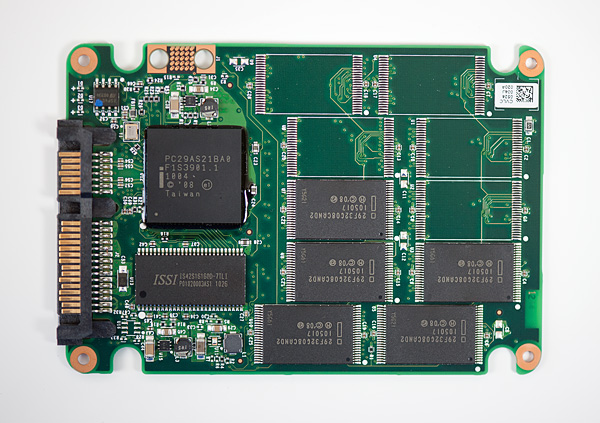Z68 SSD Caching with Corsair's F40 SandForce SSD
by Anand Lal Shimpi on May 13, 2011 3:06 AM ESTFinal Words
Despite what it may look like, Intel appears to have picked the best balance of capacity and performance with its 20GB SLC SSD 311. While I agree that $110 is a bit steep, the SSD 311 does offer surprisingly well rounded performance as a cache. Intel mentioned to me that it did some tweaks to the 311's firmware to improve its performance as a cache, which could help explain just how well it does in our tests. Where the 311 does fall short however is in its capacity and pricing. I'd like to see a 40GB drive priced below $80, however even with a move to 25nm NAND I'm not sure we'd see that from Intel.
Corsair's F40 does pretty well as a cache and if you've got one around the house by all means go for it. Unless you've got a huge collection of applications and games that you'd like to cache however, I'd stick with the 311 at the same price point. If you can snag a F40 for a reduced price however, that does make it a lot more attractive. Here's to hoping that Corsair can push prices down below $85 on that drive for the Z68 users out there that want to experiment with SSD caching.












81 Comments
View All Comments
Dribble - Friday, May 13, 2011 - link
The reason being they are so common they are cheap. In the UK you can't get that 20GB Intel SSD yet, and while you could get the 40GB force (or vertex 2) the cost difference is very small - like I did you might as well get the 60GB vertex 2. I suspect a few others will do the same thing.Hence it would seem a good test.
The other thing I'd like to know is if you can buy a large capacity SSD (e.g. 240GB vertex 3) and then partition it giving 180GB to use as a boot drive, and the other 60GB to cache your monster games disk.
10Goto10 - Friday, May 13, 2011 - link
Or a 6Gb Sata Vertex3 240 GB, it should have enough IO, throughput and space to maintain both os and cache.Ryan Smith - Friday, May 13, 2011 - link
Yes, you can partition SSDs. In fact we've thrown around the exact same idea.10Goto10 - Friday, May 13, 2011 - link
According to the test hardware spec, the test is run on H67 not Z68, copy paste ;) ??mschira - Friday, May 13, 2011 - link
Would it be possible to get some SSD caching on a thinkpad t-series? they not only have a normal hard drive slot but they also have a miniPci slot for which they explicetly support small SSD to mount there...now having SSD caching would be great...
M.
DanNeely - Friday, May 13, 2011 - link
First page, the table lists an h67 mobo for the test, not a Z68jdavenport608 - Friday, May 13, 2011 - link
Both your articles about Z68 mention that SSD caching can be used in front of a RAID array. Do you plan on doing an article that describes the benefits or value of using a SSD cache in conjunction with different RAID arrays?weh69 - Friday, May 13, 2011 - link
I'd love to see results for a 60GB SSD as cache in front of a dual 2TB WD black RAID-1 array as the system drive.hechacker1 - Friday, May 13, 2011 - link
If that is possible, I would really like to see that too.Especially for a raid-5 config. Since write performance is limited so much by parity writes, having a cache could really help (on maximum mode).
kepstin - Friday, May 13, 2011 - link
This Intel SSD caching feature is a bit disappointing in one way.It's obvious that the caching work is done completely in software - in the Windows chipset driver, the same way as the motherboard RAID features work. There probably is some BIOS support required to boot off it though.
There's no technical reason why the same technology couldn't be used on other chipsets - it's just that Intel's decided to artificially limit it to the Z68...
I wouldn't be surprised if third-party tools and a generic Linux driver that can do the same thing on any chipset start showing up later this year.